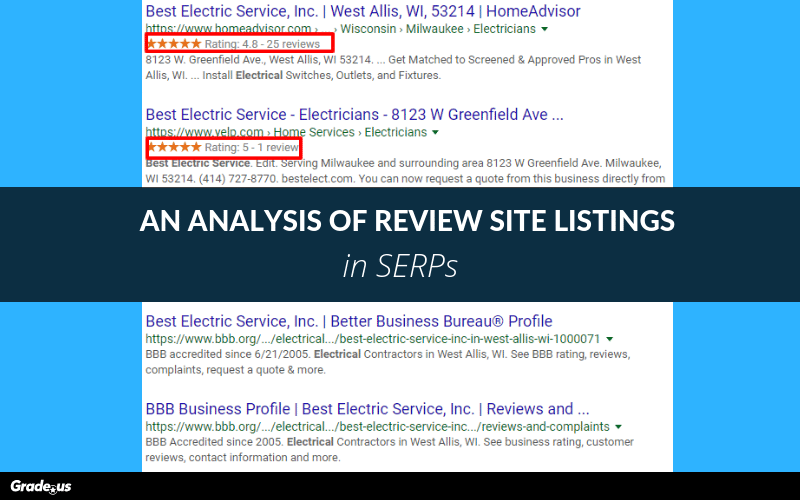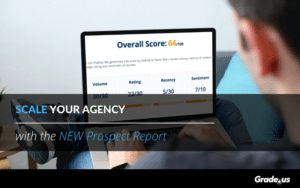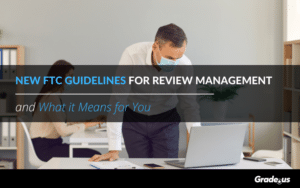It's the first thing they see.
Their reputation precedes them. When prospective customers search for your clients they receive a quick summary of their listings on review sites.
Your clients don't get it.
They're not entirely sure what their customers see. Even worse, they're not really sure why it matters, but it does. A thorough understanding of review site listings in the SERPS is crucial to their success.
Why though?
Your clients can't plan and prioritize
They don't have what they need.
This is where education comes in. Education gives you the tools you need to make a compelling case for a carefully crafted review management campaign. For clients, this could be the difference between failure and success.
How?
Clients focus on results. In the beginning, most clients are uneducated. When it comes to review management, they know the basics. Positive reviews = more sales and revenue. It's still a risk though, which means clients are hesitant.
They aren't comfortable going all in.
At least, not at first. Many clients prefer to start small. "Why don't we start with a small budget, then see what you're able to do with that?" they say. You know how it goes.
But it's simply not enough.
Your clients want a significant amount of traction. They want to achieve game-changing results. This means they'll need to go all in. That they're willing to reorient their business around review management.
They won't do that unless they're educated.
By you.
An uneducated client is a stingy client
This isn't a hard absolute.
It's a rule of thumb. A pretty reasonable aphorism. This isn't because your client is an unreasonable tightwad. It's because they don't know any better. There are lots of people clamoring for their money.
Salespeople promising the moon.
When you educate clients you (a.) give them a firm foundation they can use to sort through garbage claims made by the unscrupulous. (b.) show them (with evidence) why they should go all in on review management. (c.) the quantifiable value of prominent reviews and what to expect.
Where do you start?
The whole thing seems overwhelming - to you, to them. What do you need to teach them?
Boost your positive listings in SERPs!
It's essential to have a positive aggregate review rating across multiple review sites.
You could lose 21.9 percent of customers if you have just one negative review listed on page one of Google.
That's where Grade.us comes in. We help you generate positive reviews on all of the sites that could potentially pop up when someone searches your brand on Google.
#1: The elements of search engine results pages in Google
This. is. boring.
We're steeped in the world of marketing. If you're like most marketers, you can get excited about marketing, creative and development work. Not so with clients.
Use the wrong analogy and you lose them.
The right analogy is key. You're looking to frame the conversation using easy-to-understand details that capture their attention.
What are you covering?
The elements of search engine results in Google. You'll want to cover:
The local pack
The local pack is Google's way of displaying search queries with local intent. The local pack displays prominent listings from two to three local businesses sorted by relevance.
Businesses with a significant amount of positive reviews are often displayed more prominently than organizations without. It goes without saying that the listings with positive reviews convert more customers than those with little to no reviews.
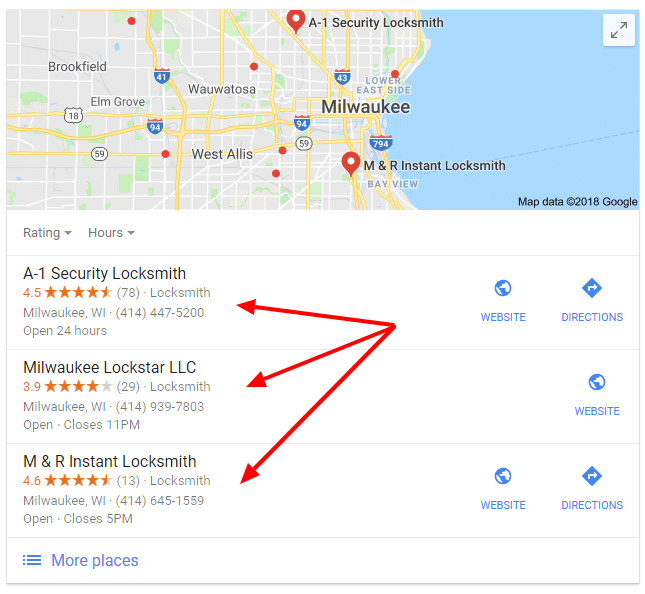
The knowledge panel
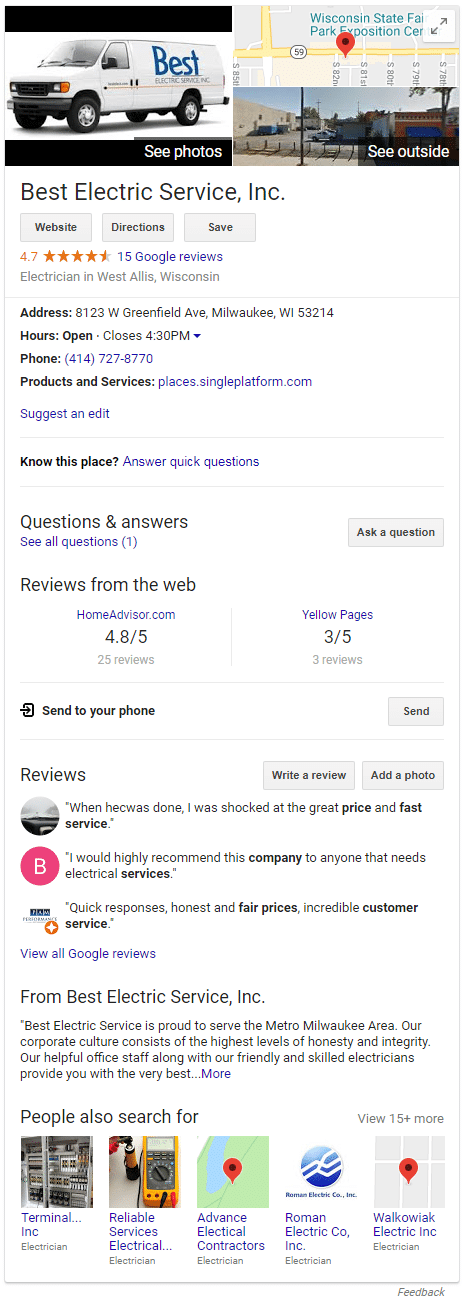
The knowledge panel is an infobox that's displayed in the SERPs to the right of search queries. It consists of business-specific information about a particular company or organization. Google pulls detailed information from their knowledge graph.
The knowledge graph is a database that's filled with millions of pieces of data about keywords people frequently search for online and the intent behind those keywords, based on content that's already available. Knowledge graph optimization is simply a way to help Google understand what your web page is about.
Review snippets via 3rd party review sites
Google displays aggregate listings via third-party sites. These star ratings are displayed via sites with a significant amount of domain authority / trust (e.g. Yelp, Yellow Pages, Home Advisor, Avvo, etc.). These snippets can include stars, summary text and a numeric scale (e.g. 8.6/10 - 936,611 votes).
Your clients can also use review snippets on sites they control provided that they meet a few guidelines.
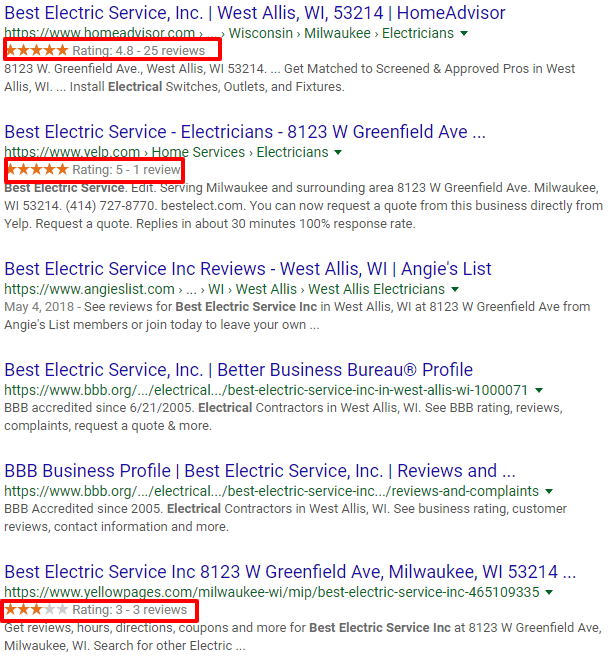
Review snippets rules include:
- Must not be written or provided by the business or content provider unless they are genuine, independent, and unpaid editorial reviews.
- Must allow customers to express both positive and negative sentiments. They may not be vetted by the business or restricted by the content provider based on the positive/negative sentiment of the review before submission to Google.
- Should not be template sentences built from data or automated metrics. For example, the following is not acceptable: “Based on X number of responses, on average people experienced X with this business.“
- Guidelines for multiple-location businesses such as retail chains or franchises. Reviews can only be submitted for the specific business location for which they were written. In other words, critic reviews for multiple-location businesses cannot be syndicated or applied to all business locations of the same company.
- There can’t be any commercial agreements (paid or otherwise) to provide critic reviews between the content provider and the reviewed business.
- Do not include critic reviews that are duplicate or similar across many businesses.
- Only include critic reviews that have been directly produced by your site, not reviews from third- party sites or syndicated reviews.
Google includes a variety of additional requirements for review snippets. We still maintain the tools to follow Google's reviews when it comes to marking up reviews with data structure schema friendly markup.
Google Guaranteed, Local Service Ads and Local service reviews
Wouldn't it be great if Google was willing to vouch for your reputation?
The good news is they are.
Google offers three new programs. Google Guaranteed, Local Service Ads and Local Services reviews.
What about Google Guaranteed?
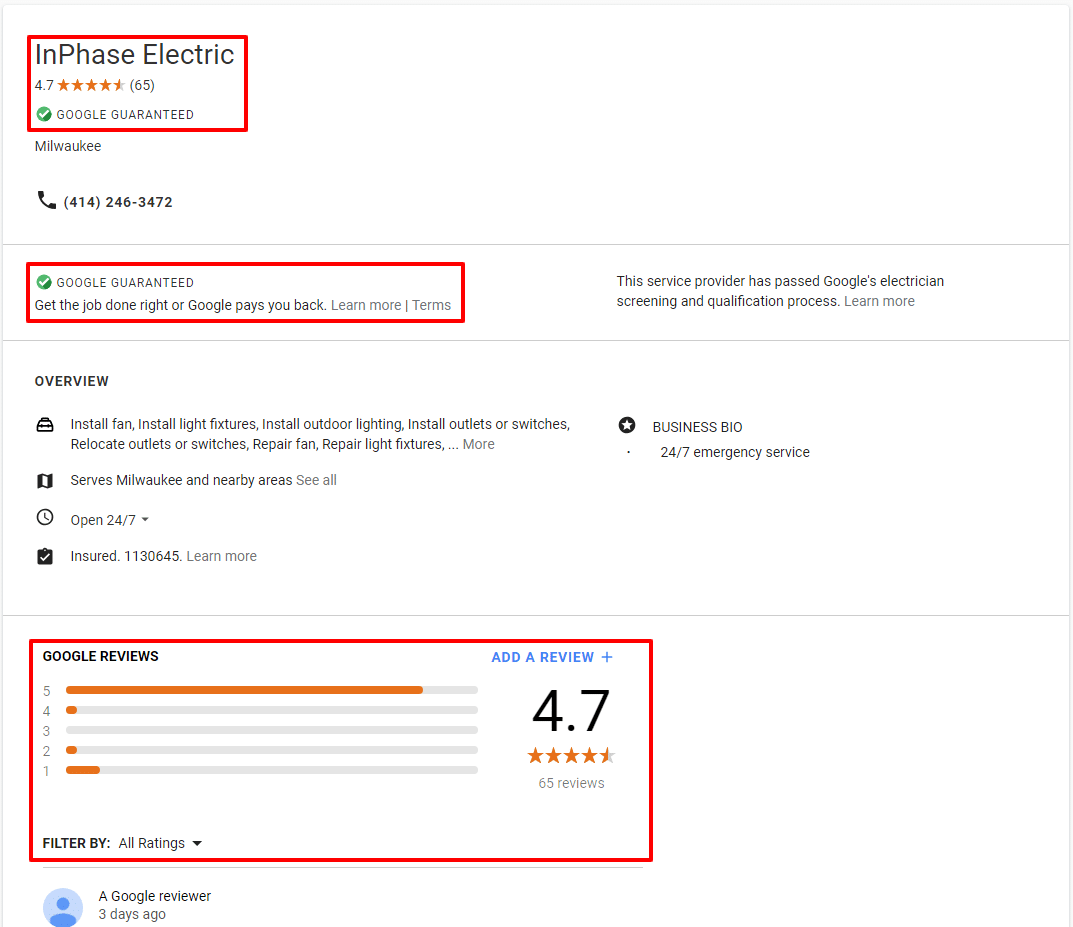
- If your customer is dissatisfied with work quality, we’ll cover claims up to the job invoice amount, with a lifetime cap for coverage.
- Service must be booked through Local Services. Add-on or future projects, damages to property, dissatisfaction with price or provider responsiveness, and cancellations aren’t covered.
- Claims must be submitted within 30 days of the initial service completion date.
How do local service reviews work?
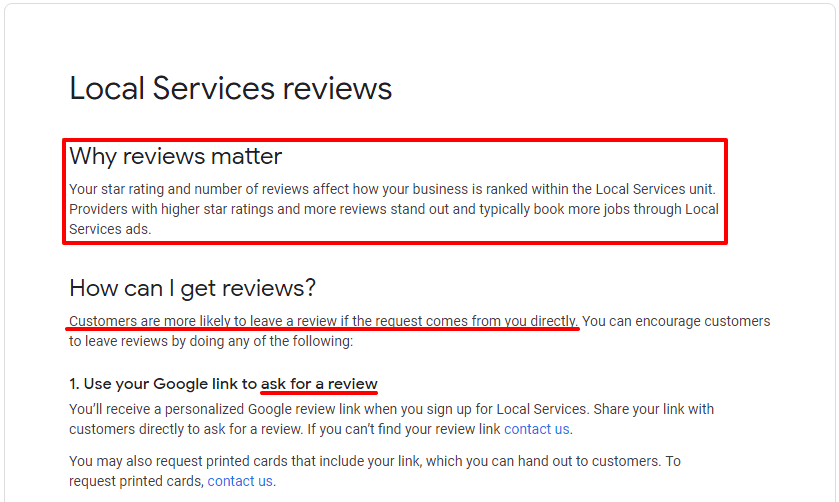
If you attract more positive customer reviews Google rewards you with better rankings.
"Your star rating and number of reviews affect how your business is ranked within the Local Services unit. Providers with higher star ratings and more reviews stand out and typically book more jobs through Local Services ads."
With this program, customers are able to leave verified, anonymous, and Google My Business reviews.
How do local service ads work?
Are displayed at the top of the SERPs for local queries.
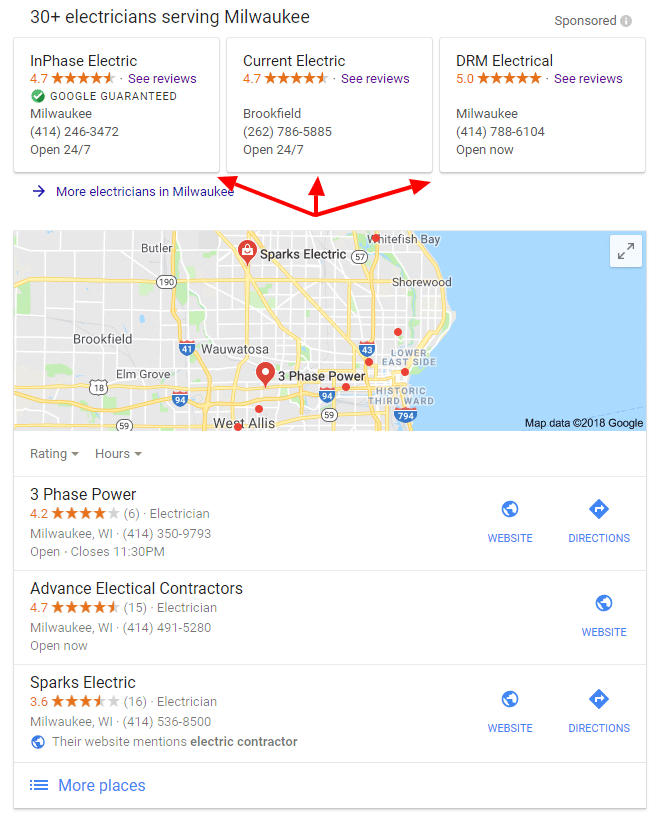
This is heavier on the direct response:
"With Local Services ads, you can advertise your business on Google and receive leads directly from potential customers. These leads come in as phone calls and messages sent through your Local Services ad. You can reply to messages, track bookings, and manage all your leads anytime online and through the app (Android, iOS)."
Driving reviewers to Google improves the effectiveness of your advertising.
Google Ads
You can also inject social proof into your Google ads copy via direct quotes and excerpts from actual reviews. You can draw customers in with rave reviews left on third-party sites.
Pro tip:
Avoid paraphrasing.Don't embellish, paraphrase or gently "massage" the truth. Your reviews are more likely to be approved if you can directly reference a positive review on a third-party review site listing.
As an added bonus you can still use review extensions via Bing, for now.
Another important point to cover. The SERPs on review sites themselves have ads as well. If you're looking to advertise on a particular site you'll want to keep this in mind.
Notice I'm covering this from a review management standpoint. If you notice that clients are unfamiliar with the basics of search engines and how SERPs operate it's best to start there. Here are a few helpful guides you can use if you need to start from the ground floor.
- The Moz Beginner’s Guide to SEO
- Buffer’s Guide to SEO
- The Anatomy of a Search Listing via Search Engine Land
You're probably already familiar with these guides. You can use these as reference points (along with the right analogy) to provide your clients with the right education.
#2: Choose the right review site
There are dozens of review sites. Which one should you choose?
The short answer is, it depends.
There are several sites that appear frequently when searching for a business.
· Google. According to a recent survey, Google is now the review site of choice for 63.6 percent of consumers. It's also the platform that consistently gains the highest number of new reviews. This means Google is the 800 lbs. gorilla that requires your attention.
· Facebook, Yelp, TripAdvisor and Foursquare bring up the rear in our study. Each of these sites receives a massive amount of mainstream attention from both devoted followers and casual browsers. When you include the social sharing component, Facebook has a tremendous reach.
· BBB. It's a non-profit that needs no introduction. It's a top 5,000 site that receives 88 million unique visits per year and generates more than 165 million reviews. The BBB carries a significant amount of clout with web searchers, even if they don't follow the five-star rating system Google prefers.
According to Neil Patel, the first law of sales funnel friction is visibility. The more visible you are the more traffic, leads and sales you'll receive.
This isn't everything though.
Your clients are specialists. They aren't all things to all customers, which is precisely why clients should focus on industry specific reviews.
Why?
That's where sophisticated, sales ready prospects go. To specialty review sites. Here's a brief list of review sites divided by industry/niche.
What makes these sites so special?
Sales-ready prospects are looking for answers to very specific questions. These specialty review sites do the educating for your clients. They rank well in the SERPs and they attract the discerning, sales-ready prospects your clients need.
There's a price to pay for that though.
Average prospects are more easily impressed. They’re easier to mold, guide and direct for one simple reason. They don’t know anything.
With specialty review sites, their biggest selling point is also their biggest downside.
These customers are sophisticated and far more knowledgeable than the average customer. That’s wonderful if your client is actually the capable and knowledgeable expert they believe them to be. If they’re not, these prospects will notice, and they’ll walk away immediately.
Here's another problem.
Review snippets with a poor rating.
See this?

Review snippets with a poor rating need to be addressed immediately.
Why?
These review snippets tell you a few things. (1.) your clients value a specific set of review sites or platforms. (2.) Google has decided to rank that review site highly, but your aggregate rating is low. (3.) Your clients are losing potential customers to these unflattering snippets.
These snippets need their attention now.
They're costing them time and money. What does this mean? You'll need to direct your client's satisfied customers to this poor performing review site. You'll want to drive review traffic to chronic underperformers.
Your immediate goals should be to:
- Limit the bleeding by boosting your aggregate review rating
- Improve your aggregate results in the SERPs
- Drown any unflattering reviews in an avalanche of positive five-star reviews
- Track conversions by referrals via your analytics
If your clients have a plethora of negative or non-existent reviews, this is a teaching moment.
What are you teaching them?
Even if it's bad news, it's good news to know. They know so that means they have an opportunity to fix the problem. I've covered this before but here's how these search results impact your client's review portfolio.
Research from Moz found businesses risk losing as many as...
- 21.9 percent of customers if you have just one negative review listed on page one of Google
- 44.1 percent of customers if you have two negative results
- 59.2 percent of customers with 3 negative results
- 69.9 percent of customers with 4 negative results
So how should agencies educate their clients?
#3: Tie everything to their problems
It's easy to spam clients with data.
Doing that rarely works out the way we want though, right? Focus on your client's desires, goals, fears and frustrations. Tie your education to the challenges they're facing directly.
Use analogies they're passionate about.
Work with them. Produce easily digestible content that focuses on your client's needs. Create content that's simple, easy and measurable.
Teach incrementally.
Educate your clients consistently. Many agencies make the mistake of cramming. They try to jam as much data as they can into their client's brain, which inevitably leads to information overload.
Don't do this.
Create helpful videos like these to attract client attention. Share content in small, bite-size pieces. Creating content is a great idea - if you're willing to create something that's much better than your competitors.
What if you aren't?
What if you aren't looking to create content? No problem.
Curate instead.
Share a consistent stream of helpful content with your clients. Here's some helpful content on local search and review management.
- Local SEO: A Simple (But Complete) Guide
- 2017 Local search ranking factors
- A comprehensive guide to Local SEO 2018
- Local SEO portal on Moz
- How To Get Business Reviews: Back to Basics
- An online review playbook for service area businesses
- How To Prove the ROI of Online Review Management
- 7 Unique Email Templates for Requesting Online Reviews
A high value round-up can produce the same exact results, with 100 percent less effort.
Customers see the SERPs first
Your client's reputation precedes them. When prospective customers search for your clients they receive a quick summary of their listings on review sites.
Your clients believe they understand.
But most of them don't. They're not entirely sure what their customers see. Even worse, they're not really sure why it matters.
Your clients want results.
In the beginning, most clients are uneducated. They don't know how to analyze review listings. When it comes to analyzing reviews in the SERPs, clients know even less.
They aren't comfortable going all in.
Your clients want a significant amount of traction but they won't get it unless they're prepared to go all the way. An educated client is a generous client.
There are lots of people clamoring for their money.
But your clients know you'll produce results. Because you've educated them. You've worked with them, building the right foundation. With a consistent approach your clients will have everything they need to go "all in" on review management.
Positive first impression guaranteed.
Boost your positive listings in SERPs
It's essential to have a positive aggregate review rating across multiple review sites.
You could lose 21.9 percent of customers if you have just one negative review listed on page one of Google.
That's where Grade.us comes in. We help you generate positive reviews on all of the sites that could potentially pop up when someone searches your brand on Google.
About the Author
Andrew McDermott
Andrew McDermott is the co-founder of HooktoWin. He shows entrepreneurs how to attract and win new customers.

